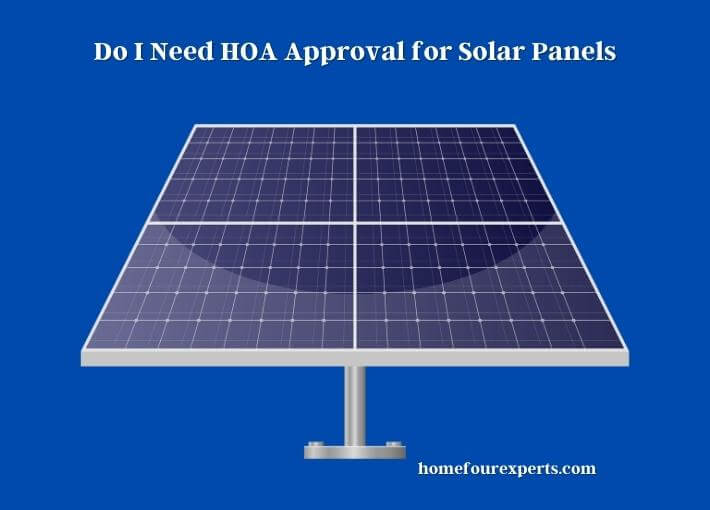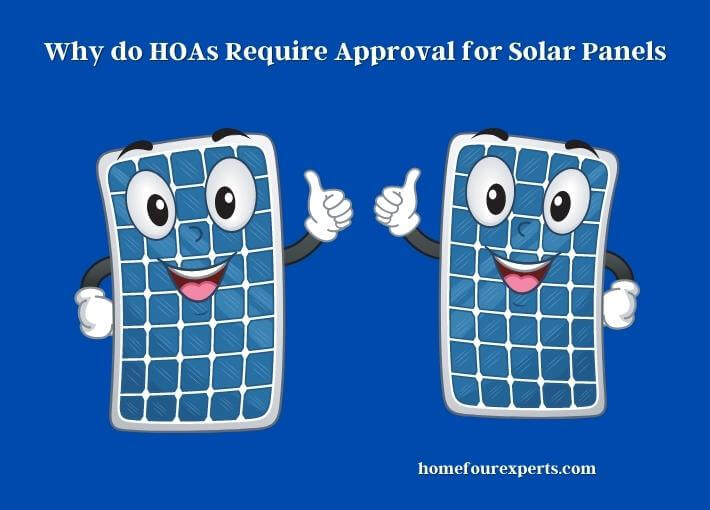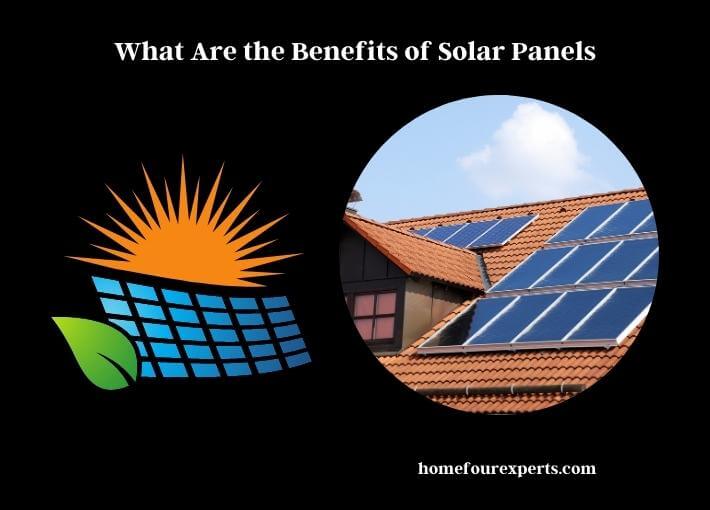In recent years, solar energy has become an increasingly popular choice for homeowners looking to reduce their carbon footprint and lower their energy costs. However, for those living in communities with Homeowners Associations (HOAs), the process of installing solar panels on their homes can be a bit more complicated.

Many HOAs have guidelines and restrictions related to home improvements, and solar panels are no exception. Homeowners must navigate these guidelines and get approval before proceeding with the installation of solar panels.
What is an HOA?
An HOA, or homeowners’ association, is a governing body that manages and enforces rules and regulations for a specific community or neighborhood. HOAs are typically comprised of homeowners who elect a board of directors to oversee the association’s affairs.
HOAs are responsible for maintaining common areas and amenities, such as parks, pools, and clubhouses. They also enforce community rules, such as guidelines for landscaping, exterior home appearance, and parking.
How do HOAs Work?
HOAs collect fees from homeowners to cover the costs of community maintenance and services. These fees are typically paid on a monthly or annual basis and may vary depending on the community’s amenities and services.
HOAs also have the power to issue fines and take legal action against homeowners who violate community rules or fail to pay fees. In some cases, HOAs may even have the authority to foreclose on a homeowner’s property.
Why do HOAs Require Approval for Solar Panels?
HOAs may require approval for solar panel installations for a variety of reasons. Some common concerns include:

- Aesthetics: HOAs may have guidelines for the appearance of homes and may be concerned that solar panels will detract from the community’s overall look and feel.
- Safety: Solar panels can be a fire hazard if not installed properly, so HOAs may want to ensure that all installations meet safety standards.
- Property values: Some HOAs may be concerned that solar panels will decrease property values by making homes less attractive to potential buyers.
What Are the Benefits of Solar Panels?
Despite the concerns that some HOAs may have, there are many benefits to installing solar panels on your home. Here are just a few:
- Lower energy bills: Solar panels can significantly reduce your monthly energy costs, potentially saving you thousands of dollars over the life of the system.
- Environmental impact: Solar energy is clean and renewable, making it an eco-friendly alternative to traditional energy sources.
- Increased home value: Many homebuyers are willing to pay more for homes with solar panels, so installing them could increase your home’s resale value.

Potential issues with HOA approval for solar panels
While HOA approval for solar panels is necessary for many communities, there are potential issues that homeowners may encounter during the approval process. One issue is related to the timeline for approval. Depending on the HOA and the complexity of the installation, the approval process can take several weeks or even months. This delay can be frustrating for homeowners who are eager to start enjoying the benefits of solar energy.
Another potential issue is related to the restrictions that HOAs may impose on solar panel installations. While these restrictions are typically put in place to ensure the safety and aesthetic standards of the community, they can limit the options available to homeowners. For example, some HOAs may require that solar panels be installed in a certain area of the roof or may restrict the type of panel that can be used.
Finally, there is the issue of cost. In some cases, HOAs may require homeowners to pay for an engineering review or other fees related to the approval process. These costs can add up quickly, making solar panel installations more expensive than they would be otherwise.
How to Request HOA Approval for Solar Panels?
If you’re interested in installing solar panels on your home, the first step is to review your HOA’s bylaws and regulations. Look for any guidelines related to solar panel installations, and note any specific requirements for approval.
Prepare a proposal for your solar panel installation that addresses your HOA’s concerns. This may include information on the aesthetic design of the panels, proof of compliance with safety standards, and an analysis of potential property value increases.
Submit your proposal to your HOA, and be prepared to answer any questions or concerns they may have. It’s also a good idea to attend any meetings related to your proposal and speak with other homeowners who may be interested in solar panel installations.
Tips for Working With Your HOA
If you’re navigating the process of getting HOA approval for solar panels, here are some tips to keep in mind:
- Make sure you understand your HOA’s bylaws and regulations related to solar panel installations before submitting your proposal.
- Remember that your HOA is made up of your neighbors, and be courteous in all of your interactions.
- Clearly explain your proposal and be prepared to answer any questions or concerns your HOA may have.
- The approval process can be time-consuming, so be prepared for a potentially lengthy wait.
- If your HOA has concerns about your proposal, be open to making adjustments to address those concerns.
State Laws and Solar Panel Installations
To HOA guidelines, state laws also play a role in the installation of solar panels on homes. Many states have enacted laws that protect the rights of homeowners to install solar panels, regardless of any restrictions or guidelines put in place by their HOA. These laws are often called “solar access laws” or “solar rights laws,” and they vary from state to state.
Some solar access laws prohibit HOAs from completely prohibiting solar panel installations, while others require HOAs to have reasonable guidelines related to solar panel installations. Additionally, some states have tax incentives or other programs in place to encourage the use of solar energy.
It’s important for homeowners to research the laws in their state related to solar panel installations, as well as any guidelines put in place by their HOA. By doing so, homeowners can ensure that they are following all necessary regulations and taking advantage of any available incentives or programs.
Financing Options for Solar Panels
The cost of solar panel installations can be a concern for homeowners, but there are a variety of financing options available that can help make solar energy more affordable. One popular option is a solar loan, which is a type of loan specifically designed for solar panel installations. These loans typically have lower interest rates than traditional personal loans and can be paid back over a longer period of time, often up to 20 years. Some solar loans are also structured so that the payments are similar to or even lower than the homeowner’s current monthly energy bill.
Another option is a solar lease or power purchase agreement (PPA). With a solar lease, the homeowner leases the solar panels from a third-party company and pays a monthly fee for their use. With a PPA, the third-party company owns the solar panels and sells the electricity generated by the panels back to the homeowner at a fixed rate. Both of these options can help homeowners save money on their energy bills without having to make a large upfront investment in solar panels.
There are also government incentives and programs available to help make solar energy more affordable. For example, the federal government offers a solar investment tax credit (ITC) that can offset up to 26% of the cost of a solar panel installation. Some states also offer their own tax incentives or rebate programs for homeowners who install solar panels.
By exploring these financing options, homeowners can make solar energy more accessible and affordable for their homes. It’s important for homeowners to do their research and work with a reputable installer to ensure that they are getting the best financing option for their needs.
Wrap Up
If you are considering installing solar panels on your home and you live in a community with an HOA, it’s important to research your HOA’s guidelines and get approval before proceeding with the installation. While some HOAs may have restrictions or requirements related to solar panel installations, it’s important to remember that these restrictions must be reasonable and cannot completely prohibit solar panel installations.
Installing solar panels can increase your home’s value and there are tax incentives available for homeowners who choose to make the investment. By doing your research and working with your HOA, you can enjoy the benefits of solar energy while also complying with your community’s guidelines.
About This Writer

Hi, I am responsible for the 'Homeowners Power Solutions' category. My name is Liam Jaxon and a licensed technician with 7 years of experience in vehicle batteries, electrical gadgets, and home appliances. My working experience in different residential & light commercial electrical sectors and the automobile industry helped to acquire vast knowledge in this industry.